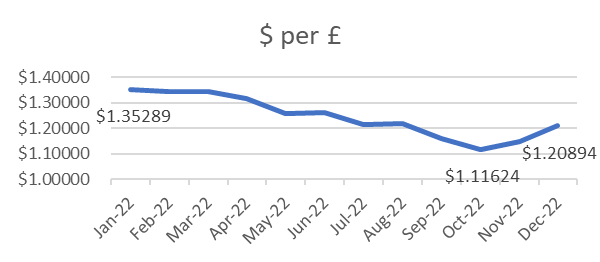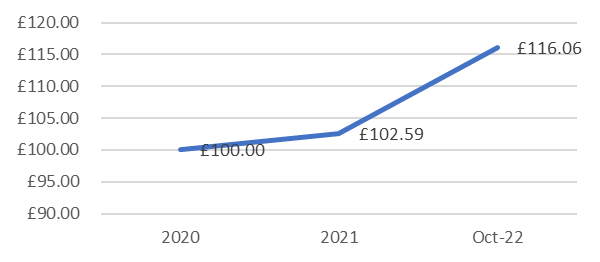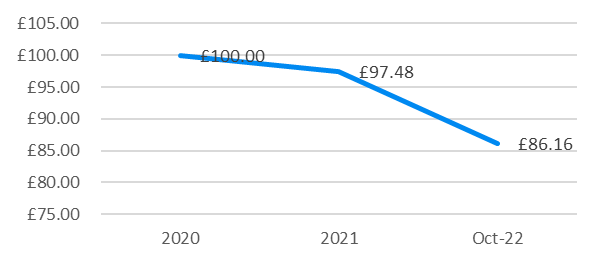Written by Nick Ellis
For people in Eastry, like everywhere in the UK, food & energy inflation are causing real problems. Eastry CAN are providing access to subsidised and no-cost meals at the Five Bells to ensure no one in the village has to choose between heating and eating. Here, we look at the causes of the problem and how we can help.
If you want to check our data, go to the Bank of England Inflation Calculator and to xe.com. To stay in touch, perhaps sign up for our newsletter?
The Background
Let’s be honest, things are a bit of a mess at the moment. The cost of living is increasing all the time, and it’s hard to see when it will end.
First up, let me say that it will end. Things will improve. I truly believe that. I don’t know when, and I can’t offer much hope beyond optimism, but any of us over 30 have lived through times like this before – the rampant unemployment of the 1970s and 80s, the so-called ‘Winter of Discontent’, 1993 and ‘Black Wednesday’ when the economy went into freefall, the 2008 credit crunch. Stuff happens – and then things get better.
But right now, we have a challenge. That challenge comes in two forms of supply chain disruption – energy, in the form of Russian oil and gas, and food in the form of grain. Did you know that Ukraine’s harvest and ability to export is critical to the global price of grain? I certainly didn’t!
Inflation plus Exchange Rates
There is a second challenge which is the UK position in global markets. It is a matter of fact that the pound has declined markedly against the dollar over 2022.

Since oil, gas and grain are all traded globally in US dollars, a decline of the pound against the dollar means those things go up in price for us, even if their dollar prices were stable. And of course the dollar prices are not stable either. So rising global commodity prices compounded by a falling pound spells disaster for people who earn and spend pounds.
Headline Inflation

Since 2020 the Consumer Price Index (CPI) has gone up 16%. That probably seems a little light to many of us – that’s because the CPI focuses on the cost of goods we buy, and selects for the most commonly bought goods, updating as that changes. For example, it once included VHS tapes and now it obviously doesn’t. That’s sensible, but because it moves with our purchasing choices, it doesn’t account for qualitative decline or shrinkflation. It says “The average basket of goods is 16% more expensive than two years ago”, but it doesn’t note things like moving to own-brand, or ‘shrinkflation’ where manufacturers sell smaller packs at the same price. I’m old enough to remember when Jaffa Cakes came in packs of 12!
Nonetheless, the CPI is the index used by the Bank of England so we will use it here. What it means is that if you go to a supermarket and buy £100 of goods, you’re getting £86.16 worth of stuff in 2020 prices. You’ve lost £13.84 of buying power.

Do that every week, and you’re £719.68 worse off than you were in 2020.
Isn’t the government helping?
Yes. Kind of. There are in fact a lot of programmes of relief for people in serious food poverty. And it is certainly true that if you are elderly, disabled, have educational difficulties or a neurological diagnosis such as ADHD or autism you will have been guided to these by professionals. We offer our services to any of these people who would like support providing for themselves or their dependents.
However there is an additional group that we are particularly concerned to help – those experiencing ‘in-work poverty’. Back in 2017 Theresa May gave a speech about those who were ‘just about managing’, the ‘jams’ as the media inevitably abbreviated it to. Consider where those people are now, 5 years on, with relatively stagnant wage growth and inflation approaching 20%. That group, people who have not had need of the government services, who perhaps have prided themselves on their independence, but who are now finding it impossible to ‘just about manage’ is one of our primary areas of concern.
So what are we doing?
We know it’s limited, we know we can’t change the world. But we can provide households who need it a bit of support in getting hot food and a warm place. By funding meals in the Five Bells (and other businesses as it becomes possible) we hope to lift a little bit of the burden. And if people don’t want to sit in a pub that’s fine – they can get the meal as a takeaway served at the back door by the kitchen.
We are trying to create a simple, targeted, but importantly judgement-free way of helping out.
